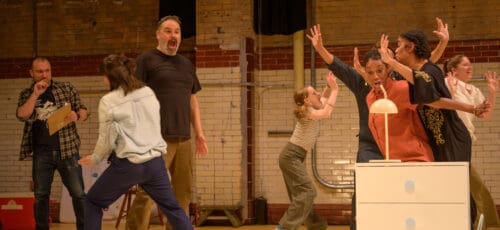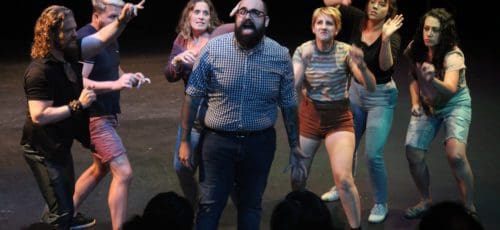A Couple Airwaves Removed from Reality: Interview with writer and director Tina Satter
“It’s a slightly abstracted, theatricalized space, because it’s theater and I’m always interested in theater taking me beyond the edges of reality.”

In the Pony Palace/FOOTBALL. Photo by Hunter Canning.
Coming to this year’s Fringe Festival, In the Pony Palace/FOOTBALL, brings an all female and genderqueer cast of football players, coaches, and cheerleaders on stage as part of the Presented Fringe. The play by Half Straddle combines the iconic imagery of football with the linguistic particularity of high school girls, all backed by a live brass band. Half Straddle is a New York City-based company that produces plays, performances, videos, and music written and directed by Tina Satter. We caught up with Tina to find out more about her In the Pony Palace/FOOTBALL, which will be in the Festival Sept 17–19.
FringeArts: Why is the show title In the Pony Palace/FOOTBALL?
Tina Satter: I was calling the show just “FOOTBALL” for a while because it was about football and that worked for me. Then I was trying to work more on the script and push further into it and I was struggling. Jess Barbagallo, who plays the quarterback in the show, told me that they had overheard these young cool-looking girls having this awesome conversation where they referenced something being “downstairs in the pony palace…” Neither of us knew what that meant at all, but the concept of girls discussing a “pony palace” totally opened up the conceptual premise of the show to capture this more intangible special athlete-girl world of the play that I wanted to feel slightly off to the side of real life.
I made “pony palace” the name of their locker room in the play as well. I was able to then create the script and overall concept I was looking for. And then it seemed really important that the wonderful, weird phrase/idea of “Pony Palace” was actually reflected in the title of the show
FringeArts: How did your experience with sports in high school and college inform this play?
Tina Satter: My main sport I played all throughout high school and at Bowdoin College on a Division III team was field hockey. I totally drew from my experience of working really hard with, laughing with, riding buses with, losing with and feeling utterly devastated, and then winning with these groups of girls with whom I had been on these teams all these years. The coded language you have. This incredible sense of effort and honor towards something that, at the end of it all, you know is just a sport, a game, but that really signifies a kind of personal integrity and group effort and belief in something bigger than yourself that, even at that time, and definitely after, I found very inspiring.
So I took all the feelings, memories, and dynamics of playing field hockey and put them onto this idea of a team playing football instead of field hockey. There was something about the larger iconic significance of football that seemed to be what I wanted to use as opposed to field hockey, which is much more obscure in the U.S. I also wanted to use the idea of girls just totally playing without comment in this sport that, the vast majority of the time, only males are allowed to play on a competitive level.
FringeArts: How did the work evolve from your writing of it to your directing of it?
Tina Satter: I don’t think of the plays I am making as just scripts that can be filled out by someone else in a directorial capacity. They are these whole conceptual worlds and feelings that I am just as invested in as I am in the characters and narratives. There is almost not a difference between the writing and directing, because I ultimately have this idea of how every molecule of it should feel, especially the overall rhythm. Of course I’m constantly taking advice, ideas, and in-the-moment inspiration in the rehearsal room from my incredible performers and design collaborators, and adjusting my ideas.

In the Pony Palace/FOOTBALL. Photo by Hunter Canning.
FringeArts: What is the setting of this piece and how does it appeal to your imagination and artistic sensibilities?
Tina Satter: The setting is a high school football team that exists a couple airwaves removed from reality. It’s a slightly abstracted, theatricalized space, because it’s theater and I’m always interested in theater taking me beyond the edges of reality into a liminal and exciting space in subtle unexpected ways. I want it to feel like something we’ve never quite seen or felt before. To me, that’s a huge part of making something.
So in this case it’s an all-female high school football team that plays football with all the recognizable signifiers—the football uniforms, the sports language, the athletic posturing—but then all edged-out with this kind of made-up, tweaked valley girl speak and poeticized sense of what athletics and the team mean. In the play we see a snapshot of their season as they play several games and have interactions on and off the field that are related to football, to their adolescent sense of the banal, and to bigger things in the act of self-discovery.
FringeArts: Why football?
Tina Satter: It’s the iconic, totally American, very, very male sport that feels universal, but that’s also something only men can play. That’s totally weird when you actually think about it. This thing that just men play, that mostly men watch—not entirely, but primarily—so it’s really this highly segmented gender thing. I wanted to play with that.
But to me, initially it was not a political act to make the play at all, because my first draw was the awesome uniforms and the language and the toughness to the sport and getting to poeticize all that in my world and with the performers I work with. I wanted to make a kind of sports play. That was my main driving factor—an artistic interest in the framework of this particularly iconic tough sport and the aesthetics and language it allowed me to play with. But the fact that it does then become political is great by me.
FringeArts: When you watch the performance, what affects you the most?
Tina Satter: I love the games. They are just exciting. We have the lights made to feel like how those great bright stadium lights feel in real life on green sports fields, and we have the mini live brass band on the side pumping out these great songs, and the performers are totally in it, running these plays and reacting to the gains and losses on the field. And all this is happening in these pretty small theater spaces—it’s just really exciting and unexpectedly visceral, and feels like these beautiful but difference dances. So I think a little transcendence can happen in those sections when all the elements and the feeling in the room line up, which it often does.
FringeArts: How has the play changed most significantly?
What has changed most significantly from when I first saw it is that now I play Coach. That is a whole new thing, to actually be up in the action now. I always craved being part of the games when we rehearsed the show for the original run. It just looked so fun. But I am not really a performer at all. But it just makes sense with how big the show is when we’re on tour for me to play Coach. I’m not actually in the games as a player, but I am up there yelling at them, and it’s terrifying and totally fun.

In the Pony Palace/FOOTBALL. Photo by Hunter Canning.
FringeArts: What’s it like to re-enter the world of teens as an adult?
Tina Satter: I don’t really think of it as re-entry. I think it’s more like channeling a part of myself that, for better or worse, is still very, very present. An adolescent interest in pop culture, and huge amounts of feeling, and craving a kind of unknown, undefined beauty, and the idea that anything could still be possible—all those are things that are still close to the surface to me, which is in part why I make art, and particularly shows like this.
But I couldn’t have made shows at all like this when I was an adolescent or even too close to that age. It’s being able to feel what that felt like and also how it feels to be the way I am now. It’s having that reflective and intellectual distance to see them as material—and not the complete and actual state of my brain and heart currently—but knowing that all that real residue from adolescence is not that far away at all in a certain sense.
Thank you, Tina. We can’t wait!
Fringe tickets are already on sale! Get your tickets to In The Pony Palace/FOOTBALL at fringearts.com.
In the Pony Palace/FOOTBALL
Christ Church Neighborhood House
20 N American St (by 2nd + Market)
Wheelchair accessible
$29 / Members pay $20.30
Students + 25-and-under pay $15
Sept 17–19 at 7pm


